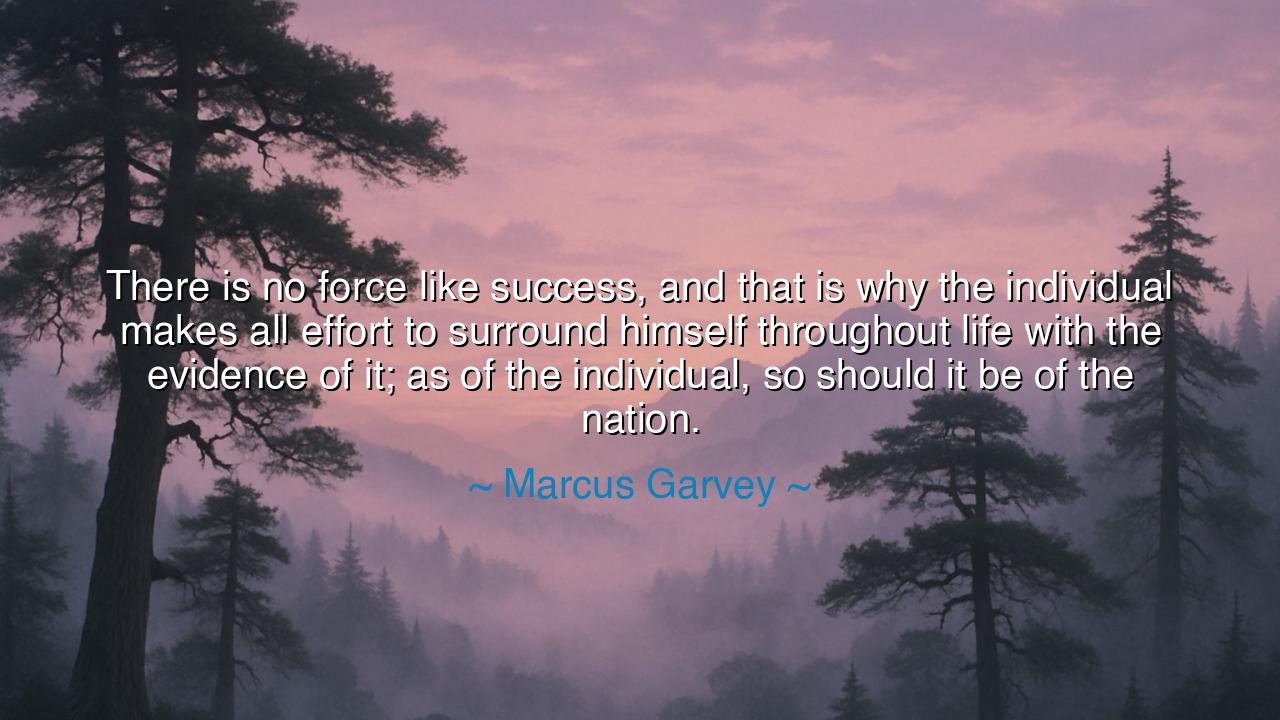
There is no force like success, and that is why the individual
There is no force like success, and that is why the individual makes all effort to surround himself throughout life with the evidence of it; as of the individual, so should it be of the nation.






Hear the thunderous words of Marcus Garvey, prophet of pride and nationhood, who declared: “There is no force like success, and that is why the individual makes all effort to surround himself throughout life with the evidence of it; as of the individual, so should it be of the nation.” In this proclamation, he unveils a truth that binds the destiny of man to the destiny of peoples: that success is not only strength, but also proof, a light that draws others, a force that compels respect and admiration.
When he says “there is no force like success,” he speaks of its power to inspire, to command, to reshape lives. Success silences critics, strengthens the weary, and becomes a shield against doubt. The one who achieves is not easily dismissed, for the evidence of his labor surrounds him like armor. So too for nations: a nation that thrives, that builds monuments, schools, and wealth, demands recognition from the world. Success, whether of man or of people, becomes a banner that no army can tear down.
Garvey understood this from his own struggle. Born in Jamaica, rising from humble beginnings, he fought against ridicule, poverty, and prejudice. Yet through his words and vision, he built a movement that inspired millions. He saw clearly that the oppressed could not simply beg for respect—they had to prove themselves through success, through enterprises, education, and unity. His call was not for pity, but for power born of achievement.
History itself testifies to his wisdom. Consider Japan in the late nineteenth century, emerging from centuries of isolation. Surrounded by powerful empires, it was dismissed as weak. Yet through effort, reform, and discipline, Japan rose rapidly, building industries, armies, and institutions. Within a few decades, it defeated mighty Russia, shocking the world. This was the evidence of national success, and from it came respect, influence, and a new place in the order of nations. What Garvey demanded for his people was no different: to rise by the undeniable proof of success.
The second part of his teaching reveals the mirror between individual and nation. Just as a man surrounds himself with the fruits of his victories—his craft, his home, his legacy—so too must a nation surround itself with the works of its triumphs. Roads, schools, libraries, businesses, and art are the evidence of a people’s greatness. Without them, the nation is mocked and ignored; with them, it stands tall among others. The individual who climbs lifts himself; the nation that climbs lifts generations.
O children of tomorrow, take heed of this counsel: seek not only the dream of success, but its evidence. Let your actions speak through works, not empty words. Build, create, achieve, and surround your life with the proof of your striving. For others may doubt your heart, but they cannot deny your fruit. And as it is with you, so it must be with your people: let your community, your nation, shine with visible triumphs that inspire respect and unity.
Let your practice be thus: in your personal life, work steadily, achieve earnestly, and let your success be a beacon for others. In your community, support enterprises, education, and institutions that lift all together. Do not wait for another to give you recognition—earn it, prove it, embody it. For as Garvey taught, there is no force like success.
So remember his words: success is more than triumph—it is power, it is respect, it is evidence that cannot be ignored. Surround yourself with it, and let your people do the same. Then neither you nor your nation shall walk bowed, but shall stand radiant in the company of the great, commanding honor through the undeniable force of achievement.






AAdministratorAdministrator
Welcome, honored guests. Please leave a comment, we will respond soon